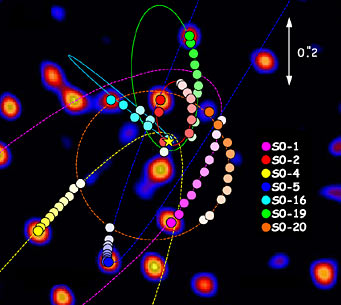|
|
 Originally Posted by chemist

Do black holes have measurable mass or energy?
Yes.
In general, the mass of an object is found by observing its effect on other, known masses. We've gotten pretty clever at determining the mass of stars based on their emissions. One of the ways we locate black holes by observing stars in orbits about an unseen object. When that unseen object is of a certain mass and the orbital path of nearby stars brings them close enough to rule out less dense objects, then the only candidate for the source of mass is a black hole.
Check it out!

The orbits of stars within the central 1 square arcsecond of the Milky Way, centered on the location of the central black hole (yellow star symbol). The fuzzy blobs are diffraction-limited star images in a frame taken by the 10-meter Keck telescope in 2004. While every star in this image has been seen to move, estimates of orbital parameters are only possible for those that have had significant curvature detected. The annual average positions for these seven stars are plotted as colored dots, which have increasing color saturation with time. Also plotted are the best fitting simultaneous orbital solutions. These orbits provide the best data yet on the mass of the central black hole.
(Source)
 Originally Posted by chemist

When they swallow stars and galaxies do they not break the first law of thermodynamics for the closed system of the universe?
Dunno. It's a fairly hotly debated topic in physics right now.
I'm not sure that the "closed system of the universe" is a correct description of a universe which contains event horizons, myself.
Stupid black holes being so totally awesome, while also being really, really, really, ... , really far away and hard to experiment on.
|









 Reply With Quote
Reply With Quote